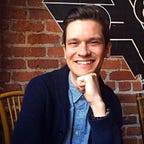Staff Spotlight: Hannah Kates
After little over a year, NYC Planning Labs has doubled in size. As we begin 2019, we thought it’d be a good idea to spotlight the newest additions to our staff with a couple of questions about themselves, their interests, and what brought them to this team in the first place.
First up is Hannah Kates, who started with Labs in September. Since beginning, she’s made hundreds of contributions to our projects.
Hannah wears two hats as a Product Manager and Developer, guaranteeing delivery of features to internal customers, cultivating relationships with existing and new partners, researching user needs, and — to top it all off — committing a bunch of source code to our projects.
Labs: Hannah, what brought you to NYC? And where were you before that?
Hannah Kates: I moved to New York for grad school four years ago. I grew up in Sarasota, Florida, but I’ve moved around a lot since, spending time in Atlanta, Vietnam, Kansas City, and Boston before moving here.
Labs: Boston… I’ve heard of that… [laughter]. You have a lot of experience outside of NYC, but you were actually already adjacent to Labs before moving laterally, correct?
HK: Correct. Before joining Labs, I worked on the Capital Planning team at NYC Planning. My role involved doing analysis focused on the City’s facilities and real estate, coordinating inter-agency projects, developing databases, and building interactive maps.
Labs: How did you get interested in urban planning? Technology?
HK: I got interested in urban planning while working as an environmental engineer with a focus on water and sewer systems. I became curious about urban development more broadly, asking questions like: how and why are new neighborhoods built? Who decides what local government should pay for? How are things prioritized?
The desire to learn more about economics and policy led me to pursue my Master of Urban Planning at NYU. Once I got into planning school, I quickly learned there often isn’t a clear “right” answer in the policy world. That realization motivated to me to try to inform policy decisions as much as possible with data and analytics. That path got me into coding, data storytelling, and civic technology.
“I’m responsible for maintaining a macro-level view across our growing portfolio of apps…”
Labs: What is your role in Labs?
HK: Since we’re such a small team, we all contribute as developers, but some of us also take lead on more specialized aspects of our team’s work. I am our team’s first product manager. This means I’m responsible for maintaining a macro-level view across our growing portfolio of apps by coordinating with our clients before we begin a sprint and making sure we are aligned on vision and priorities with all necessary inputs.
I also field and solicit input from users and coordinate user testing sessions. This informs how I figure out when to prioritize improvements on existing apps versus pursuing new project ideas. Because this is the first time the team has had a product manager, I’m still figuring out the best way to balance responsibilities of being a product manager and a developer.
Labs: Which projects are you most excited about now?
HK: I’m most excited about our current project which will make it easier for property owners to request zoning changes or other special permissions. The application for this requires several maps that are difficult for the average New Yorker to produce on their own, often requiring the use of consultants. We’re prototyping a self-service app that allows users to quickly make these maps for free, reducing barrier to entry. It’s especially exciting, because the standardized output from the app will reduce NYC Planning staff time spent reviewing these maps and sending back comments.
“One of the biggest challenges I’ve observed in government is complacency around technology.”
Labs: How did you make the pivot towards app development?
HK: I was first exposed to app development through work on the NYC Facilities Explorer. I was the product manager for the initial build and was inspired by how an app can make it easier for people to access information. I started contributing code to some smaller features, and it was really satisfying to build something. I enjoyed the creative, visual aspect of web development and wanted to learn more, so I took a part-time JavaScript development class at General Assembly and started working on side projects.
Labs: What do you think are some of the biggest challenges with regards to government and effective use of technology?
HK: One of the biggest challenges I’ve observed in government is complacency around technology. For example, we’re frequently comparing a paper based workflow to a digital product that replicates that exact same workflow. The fact that the process is no longer on paper is already a significant win, so people don’t always dream beyond that, even though the entire process could be re-imagined and made more effective now that it’s digital. This complacency is especially dangerous when those subpar solutions are expensive because of vendor lock-in and procurement processes that make it difficult to improve and iterate on technology. Digital solutions should be constantly evolving and improving, and I think a lot of people don’t realize how much cheaper and easier it can be to build products in-house in an iterative way.
Labs: What are you listening to these days?
HK: There are a few albums I’ve been repeatedly looping through over the last few months BADBADNOTGOOD, The Staves & yMusic, and Bonobo.
When I take a break for a podcast, it’s usually for the wonderfully wonky What’s The [DATA] Point show by NYC’s Citizens Budget Commission and Gotham Gazette. They bring on interesting guests from NYC and NYS government. It’s a great way to get more insight into budget priorities.
Labs: Thanks, Hannah!
HK: Thank you!
Hannah Kates can be reached on Twitter.
